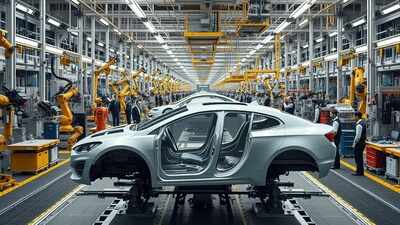Big worry! China’s grip over rare earth magnets sends Indian auto industry into a spin; delegation of industry people eye China visit

China’s hold on rare earth magnets has left the Indian auto industry worried. A contingent of automotive industry delegates is preparing to visit China to facilitate rare earth magnet imports for Indian companies, according to industry insiders.The Indian automotive sector has been compelled to take action following the Chinese government’s implementation of export restrictions on rare earth elements and associated magnets since April 4.China has introduced mandatory special export permits for seven rare earth elements and their corresponding magnets.Whilst 40-50 corporate executives have secured their visas, they are still pending approval from the Chinese commerce ministry for discussions on this subject.“Around 40-50 executives, representing both auto OEMs and component firms, have received visas and are now awaiting a go-ahead from China’s Ministry of Commerce for a meeting,” an industry source told PTI. A second source indicated that no authorisations have been granted thus far.Also Read | ‘Deal is done…’: Donald Trump announces US-China trade agreement; says China to give rare earths, America to allow Chinese students subject to….China’s ‘rare’ dominanceChina dominates global processing capabilities for magnets, commanding over 90 per cent of capacity across various sectors including automobiles, domestic appliances and renewable energy.China, which leads global exports of rare earth magnets, implemented export controls on seven rare earth elements and finished magnets in April this year, requiring export permits.The new regulations require comprehensive information about end-use and customer statements, including verification that products will not be utilised for defence purposes or re-exported to the United States.The effects are becoming evident in India, which imported 540 tonnes of magnets last fiscal year, with China supplying over 80 per cent.Although the Indian government has endorsed approximately 30 import applications by May 2025, these await Chinese authority approval, and deliveries remain pending.Impact on IndiaThe Indian automobile industry faces potential production challenges, particularly for electric vehicles, due to uncertainty surrounding these approvals.According to industry sources, Maruti Suzuki India, the country’s premier automobile manufacturer, is adjusting production schedules for its forthcoming e-VITARA model due to rare earth magnet shortages.The automobile manufacturer aims to manufacture approximately 8,000 units by September, significantly lower than their initial target of over 26,000 units for the same timeframe.Also Read | Explained: China’s monopoly on rare earth minerals spooking the world; what does it mean for India & what is it doing?Nevertheless, it intends to compensate for this production shortfall in the following months, maintaining their fiscal year target of manufacturing roughly 67,000 units, according to sources.India’s automotive sector has requested governmental assistance to accelerate approval processes for importing rare earth magnets from China.These vital materials, comprising samarium, gadolinium, terbium, dysprosium and lutetium, are fundamental components in electric motors, braking mechanisms, smartphones and missile systems.Rare earth magnets are essential components in permanent magnet synchronous motors (PMSMs) utilised in electric vehicles, providing high torque, energy efficiency and reduced size.These magnets are also crucial for hybrid vehicle propulsion. In conventional internal combustion engine (ICE) vehicles, rare earth magnets are primarily used in electric power steering and auxiliary motorised systems.Crisil Ratings indicates that rare earth magnets, despite their low cost but crucial functionality, could present a significant supply chain challenge for India’s automotive industry if China continues its export limitations and delayed shipment authorisations.Current vehicle manufacturers maintain 4-6 weeks of stock, but extended delays could impact vehicle production, particularly affecting electric vehicles with possible postponements starting July 2025.If supply constraints continue for a longer duration, there could be wider consequences for both two-wheelers and internal combustion engine passenger vehicles.





